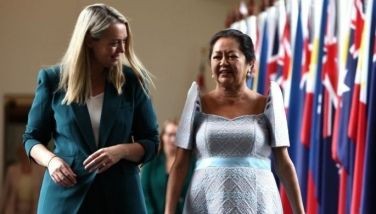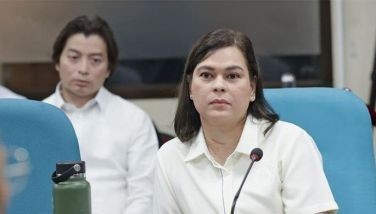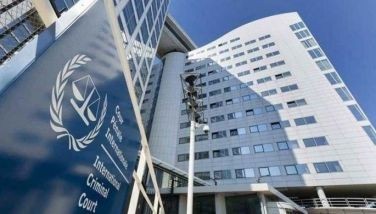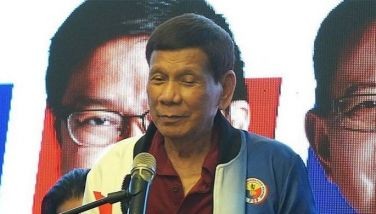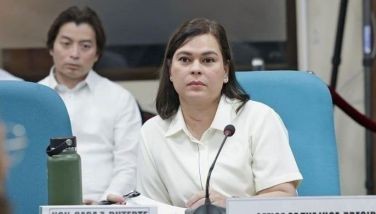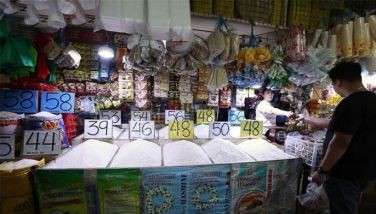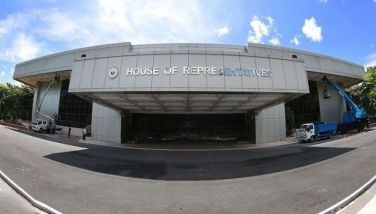Imee’s probe finds ‘glaring violations’ in Duterte arrest
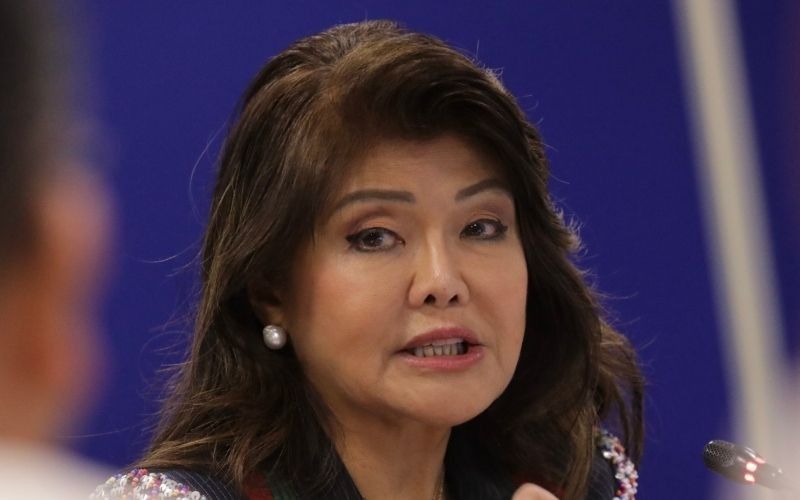
MANILA, Philippines — The Philippine government had a “comprehensive plan” to arrest former president Rodrigo Duterte and cooperate with the International Criminal Court (ICC) despite questions of sovereignty and “glaring violations” of Duterte’s rights as accused.
These were the findings contained in Sen. Imee Marcos’ preliminary report following her Senate foreign relations committee investigation on the “lack of due process” in the Philippine government’s turnover of Duterte to The Hague for his drug war-related crimes against humanity case.
The senator read out the initial report in a press briefing at the Senate yesterday, even though it showed the flip flopping positions of her brother President Marcos about the ICC jurisdiction since the country’s withdrawal from the Rome Statute, the founding treaty which established the ICC.
Senator Marcos said the three findings of her hearing are: “The Philippines had no legal obligation” to arrest Duterte and turn him over to The Hague; “the Philippine government decided to assist the ICC to arrest FPRRD;” and “there were glaring violations of FPRRD’s rights.”
Marcos claimed that there was “no red notice” because the Philippine government only enforced the ICC’s arrest warrant based on an “unverified diffusion notice” sent by the ICC to the International Criminal Police Organization (Interpol).
Marcos also claimed that there was no Philippine obligation to turn over Duterte to The Hague because the diffusion notice states that it was only for a “provisional arrest” instead of “arrest and surrender.”
“There is no indication that the ICC even requested for the surrender of FPRRD after his provisional arrest. There is likewise no indication that the ICC requested extradition after the arrest of FPRRD,” Marcos said.
“Emphasis should be given on the Administration’s narrative that they will be compelled to honor ICC’s request if Interpol transmits a red notice to Philippine authorities. It was admitted during the public hearing that there is no red notice,” she added.
But the ICC’s diffusion notice sent to Interpol is classified “red” for a “wanted” individual such as Duterte, which means it is equivalent to an Interpol “Red Notice,” said Philippine Center on Transnational Crime executive director Anthony Alcantara during the hearing. PCTC supervises the Interpol-National Center Bureau (NCB)-Manila.
A “Wanted persons red diffusion” is a notice “circulated to arrest, detain, or restrict the movement of a convicted or accused person… and checked for compliance by the Notices and Diffusions Task Force,” Interpol said in its website.
Meanwhile, an Interpol Red Notice aims to “seek the location and arrest of persons wanted for prosecution or to serve a sentence.”
In claiming that the Philippine government helped the ICC arrest Duterte, Marcos cited the admission of Interior Secretary Jonvic Remulla in a Bilyonaryo News Channel interview that there was planning involved with the President and National Security Adviser Eduardo Año to carry out the arrest.
But during the hearing, Remulla denied the existence of an alleged “core group” behind Duterte’s arrest, as he also invoked executive privilege.
Remulla also said that they only talked about “rumors” of Duterte’s arrest warrant. This prompted Marcos to say in her report: “The supposed ‘group effort’ was only based on rumors is incredible.”
“This attempt to cover up what was already aired on media indicates all the more that a comprehensive plan to arrest FPRRD was already in place even before March 11,” Marcos said, adding that there was police deployment ahead of the release of the ICC warrant.
In claiming Duterte’s rights were violated, Marcos said due process was not followed because “no warrant was issued by a Philippine court” and that “the arrest did not fall within the exceptions to a warrantless arrest.”
“Justice Secretary Jesus Crispin Remulla impliedly admitted that no effort was made to get any warrant from a Filipino court. The Constitutional safeguards for the right to liberty of abode were not observed. No court order was issued mandating that FPRRD be taken out of the Philippines against his will,” she said.
The senator said Duterte was also deprived of the right to be visited by immediate members of his family, when the police blocked his daughter, Vice President Sara Duterte, from going near him when he was taken into custody at Villamor Air Base.
Marcos cited that this right is enshrined under Republic Act 7438, which defined certain rights of persons arrested, detained, or under custodial investigation.
Seeking interim release could open other issues
Seeking the temporary release of former president Duterte could open the floodgates of other issues, including a possible freeze order on his assets and the recognition of the other directives of the ICC, which has no jurisdiction over the Philippines, Malacañang said yesterday.
The legal team of Duterte, now under the custody of the ICC in The Hague over alleged crimes against humanity, has raised the possibility of applying for an interim release pending trial. Persons who are released temporarily should comply with certain conditions, including attending court proceedings, according to ICC spokesman Fadi El Abdallah.
In a press briefing, Presidential Communications Office Undersecretary Claire Castro raised a number of questions with regard to the possible move to secure Duterte’s interim release, noting that the ICC has no jurisdiction over the Philippines.
“Does it mean that we have to recognize that ICC has jurisdiction over the Philippines? I believe the family of former President Duterte is asking and praying (to) the Supreme Court that the government should not cooperate with the ICC. So, it means that if we will not cooperate with the ICC, even that prayer or that manifestation of the ICC, we will not take cognizance of that,” the Palace press officer said.
“Although, that’s hypothetical, let us say we will cooperate with the ICC in terms of interim release. Then all other issues will be opened. The possible freeze order on his (Duterte) assets will also be opened. Would the Duterte family want us to cooperate with the ICC to search for all of their assets, whether hidden or not?”
In a recent interview, Abdallah said the issuance of a freeze order may happen at any stage of the legal proceedings.
Pressed if Marcos is open to an interim release for humanitarian reasons, Castro replied: “I will ask those who proposed that. Should the Philippines accept the jurisdiction of the ICC? Will they (Duterte camp) withdraw the petition they filed before the Supreme Court stating that we should not cooperate with the ICC?”
“Will they accept all the orders of the ICC? Will we recognize the freezing of their assets? All these we have to ask,” she said, adding that all actions related to Duterte’s case should start from his family since they are the ones with pending petitions before the high court.
‘Government not hiding anything’
Meanwhile, Malacañang maintained that the administration is not hiding anything about the arrest of former president Duterte but some sensitive matters cannot be made public.
“The executive privilege is rooted from the separation of powers, so there will be instances, including issues concerning national security, diplomatic relations, military affairs and internal deliberations within the executive branch, that the information will not be publicized,” Castro said.
“So, there will be an undue encroachment by one branch of the government over another. So we are not hiding anything. There are instances that some of the things discussed that cannot be made public,” she added.
Asked about Senator Marcos’ claim that there were “glaring” violations of Duterte’s rights, Castro replied: “That will be her opinion if she talks to Duterte supporters. But if we talk to other experts like Justice (Antonio) Carpio, Attorney (Joel) Butuyan and others who already spoke about RA (Republic Act) 9851, her view on the issue would change.”
“We only complied with the law and our obligation with the Interpol. If there are other views, that may be her personal view… There is nothing personal here,” she said.
Stop the Duterte-Ninoy comparison – lawmaker
Akbayan party-list Rep. Perci Cendaña yesterday asked the camp of former president Duterte to stop likening the latter to the late martyred Sen. Benigno Aquino Jr.
“The camp of Rodrigo Duterte should stop likening him to Ninoy Aquino and his family, as well as the absurd notion that his supposed death could secure his daughter’s place in Malacañang,” Cendaña said.
“They are not too advance in thinking and they are also delusional. A mass murderer’s death does not make a president—especially if the inheritance left is blood, betrayal and lack of sense of accountability,” he added.
“If the Duterte camp believes their brand of leadership-by-body-count will be rewarded with political sainthood, they are sorely mistaken,” he added. — Alexis Romero, Jose Rodel Clapano
- Latest
- Trending



















